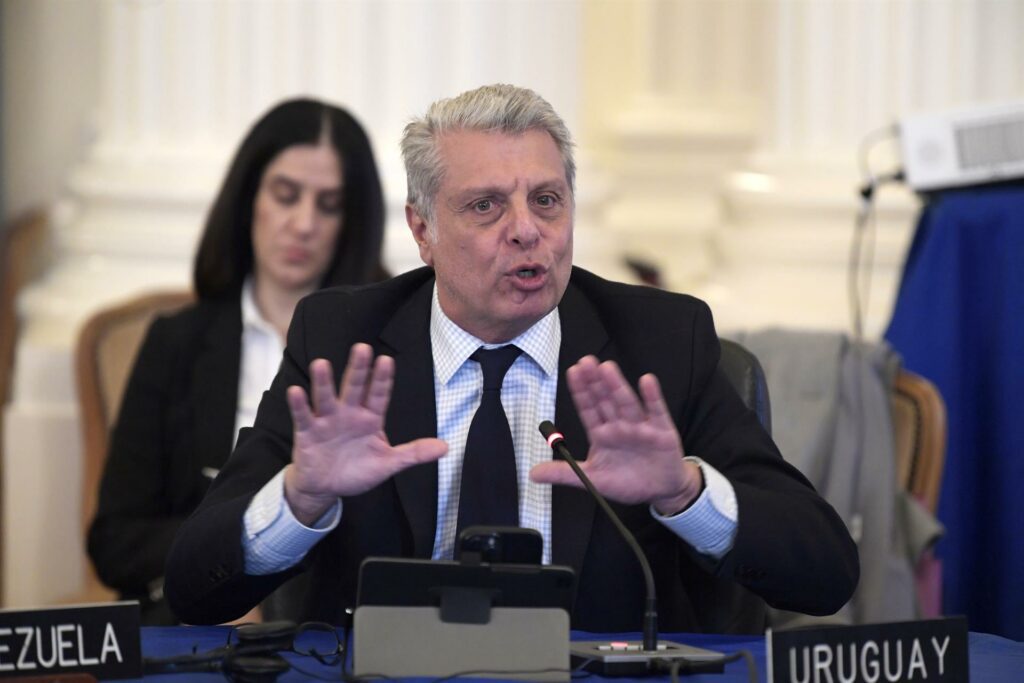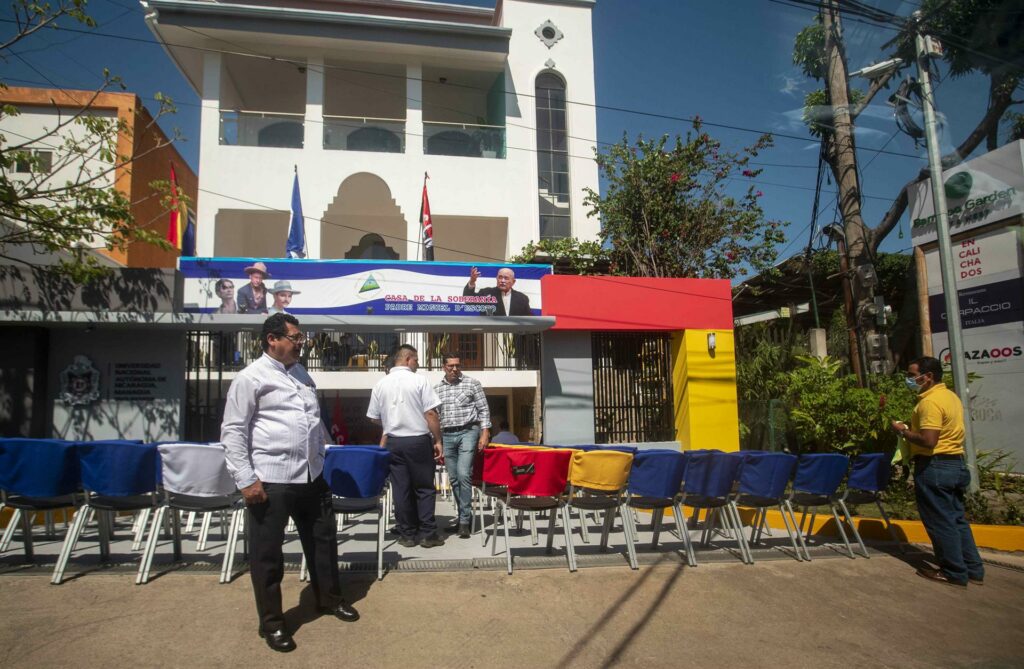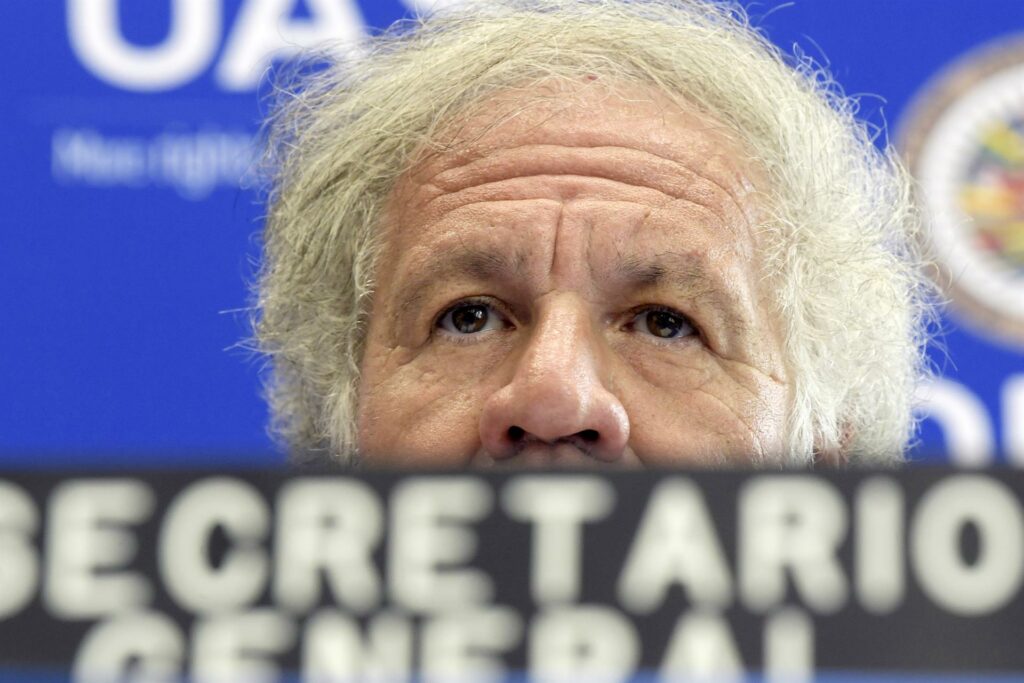The Organization of American States (OAS) was unable to deal with the regime of Daniel Ortega and Rosario Murillo in the end. After almost six years since the crisis in Nicaragua began in April 2018, the organization failed to prevent the regime’s totalitarian drift, and as of next November 19, Nicaragua’s exit from the organization becomes official.
In the latest resolution approved last November 8, the OAS recalled that the regime remains obliged “to respect all human rights reflected in customary norms; all human rights contained in the multilateral human rights conventions to which Nicaragua is a party.”
It further announced that it “will continue to pay special attention to the situation in Nicaragua, making its best efforts to promote and encourage Nicaragua’s full respect for the human rights and fundamental freedoms of all citizens of the country.”
The above, however, is one of the promises made by the OAS since the beginning of the 2018 crisis. The first resolution approved by the Permanent Council, on July 18, 2018, expressed “the willingness to collaborate and consider other measures and mechanisms it deems appropriate, in search of a peaceful solution to the situation facing Nicaragua, in accordance with the rules of the Organization.”
OAS mechanisms were not enough
DIVERGENTES counted one declaration and 17 resolutions approved by the Permanent Council or by the General Assembly, the main body of the organization, between June 2018 and November 2023. However, the political mechanisms of this organization were not enough to “move the political will of the dictatorship towards the search for a peaceful solution to the crisis,” said, on condition of anonymity, a former OAS diplomat.
Former OAS advisor Guillermo Belt pointed out that the OAS has no mechanisms to force a member state to comply with the obligations established by the organization’s Charter.
“The political bodies (the General Assembly and the Permanent Council) could and should have done much more, within their statutory powers, to pressure the dictatorship and make it respect the rights of the Nicaraguan people,” said Belt, who was an advisor to Secretary General Joao Baena Soares in the late 1980s.
Meanwhile, a sociologist who spoke to us on condition of anonymity explained that the OAS has served as an instrument of abuse containment, but “with governments that had to measure themselves, and played by the rules of the democratic game”.
However, these instruments “are insufficient” when governments, such as that of Ortega and Murillo, “decide to play other games”. In the case of Nicaragua, “Ortega and Murillo are not playing by the rules (of the OAS)”.
Consulted analysts consider that the OAS has served as an instrument of denunciation at an international level. However, “economic sanctions can be more effective than diplomatic resolutions”, said the sociologist consulted.
“Something is not right in the OAS”

In the last vote on the Nicaraguan crisis, Uruguay’s ambassador, Washington Abdala, one of the most committed diplomats to denounce the Ortega regime in the OAS, said that “they (Ortega and Murillo) are not going to run away so easily from the defense of human rights in the continent, it is not going to be so simple, it should not be so simple.” Abdala pointed out that “this is an essential issue”, since the Nicaraguan regime “has crossed all the lines”.
On the other hand, the former president of the Inter-American Commission on Human Rights (IACHR), Paulo Abrão, said about Nicaragua’s exit that self-criticism is needed. Abrão, who headed a working mission during the first months of the crisis in Nicaragua, pointed out that in 75 years a member country had been lost in the historical context of the Cold War. But in the last five years two members were lost (Nicaragua and Venezuela). “It is necessary to recognize that something is not right (in the OAS),” added Abrão.
Allegations of electoral fraud infuriated the regime
On November 19, 2021, the regime announced the decision to withdraw from the OAS, after the body rejected the legitimacy of the presidential elections held 12 days earlier, in which Ortega won a new reelection as president, and Murillo as vice president.
Months earlier, the regime carried out a raid in which some 50 political opponents, including seven presidential hopefuls, were locked up. “They were not free, fair or transparent and have no democratic legitimacy,” the body said in its resolution approved on November 12.
After announcing the withdrawal of the Nicaraguan delegation, the OAS noted that the regime “is not complying with the commitments assumed in the Inter-American Democratic Charter.”
Five months later, Foreign Minister Denis Moncada Colindres read a statement in which he ratified “the invariable decision to leave the OAS”. Moncada said that as of November 19, 2021, “we cease to be part of all the deceitful mechanisms of this monstrosity, called Permanent Council, called commissions, called meetings, called Summit of the Americas”.
Confiscation of the OAS offices, something that ” had never happened before”

Moncada also announced the closing of the OAS offices in Managua: “Consequently, this infamous organization will not have offices in our country either. Its local headquarters has been closed”. Minutes after the announcement, the National Police surrounded the OAS offices in Nicaragua, located on the outskirts of Managua, while its symbols were dismantled.
On April 28, the OAS facilities in Nicaragua were declared “of public utility”, to be used by the Nicaraguan Institute of Culture (INC) to build the “Museum of Infamy”. Thus, the facilities, located in Las Sierritas de Santo Domingo in Managua, were officially expropriated.
On May 13 of that same year, the OAS approved a new resolution condemning these expropriations of its premises. Secretary General Luis Almagro said that a situation like this had never happened during other dictatorships.
“Never, not even in the worst moments of our history, had a similar event occurred. This violation of the law is what Nicaraguans suffer every day,” Almagro said.
Voluminous and constant activity of the OAS
If the OAS could not get the regime to make changes, it was not for lack of will and neither of its officials. Since the crisis began in 2018, the bodies that make it up were activated: the Permanent Council, the General Assembly, the IACHR, until the Special Follow-up Mechanism for Nicaragua (Meseni) was created.
In addition, another working group was created that generated several reports. ” Diplomatic activity, up to the present, has been extensive and constant, through resolutions of condemnation and concrete proposals that were systematically rejected by the Government of Nicaragua,” said the former diplomat.
The specialist said that in this type of conflict it is important to take into account that in order to reach a peaceful solution “the will of all parties is crucial”. Without the consent of one of the parties, in this case the Ortega-Murillo regime, “there is no progress”, he said.
Guillermo Belt, former OAS advisor, also considers that the “Ortega-Murillo dictatorship rejected all good efforts initiated by the political bodies of the OAS”.
The OAS mistakes

For the former diplomat who was part of the organization, the OAS should take as a lesson the case of Nicaragua to start applying “preventive diplomacy” that should be extended to international relations and diplomacy. “Preventive diplomacy works with trend analysis and warning systems,” he explained.
In the case of Nicaragua, for example, before the 2018 crisis, Luis Almagro’s attitude with the Ortega and Murillo government was complacent, even when there was a history of electoral fraud and demolition of democracy.
In December 2016, after the questioned presidential elections of that year, the secretary general was complacent, after signing with Ortega a Memorandum of Understanding that he never complied with, but served the Sandinista leader to gain time and legitimize his second reelection. However, the other organs of the OAS also failed to pronounce themselves on the democratic demolition that was already taking place in the country.
According to the specialists consulted, the other mistake made by the OAS was to demonstrate that they were unable to apply the Inter-American Democratic Charter to the Ortega-Murillo regime in these five years of crisis. For the approval of this document, the vote of two thirds of the States is required, but the majority of delegations were opposed, therefore, this was not even put to a vote.
One of the reasons for not applying the Democratic Charter, which meant the expulsion of the regime’s representation, was that diplomats considered that it was better to have Nicaragua in the OAS network in order to have some leverage.
However, the voluntary departure of the regime showed that “this political calculation is wrong, at least in this case”, said the ex-diplomat.
The sociologist believes that the OAS only limited itself to making threats, which in the end Ortega himself carried out. “Surely the OAS would never have expelled Nicaragua and would have limited itself to making votes and resolutions,” said the political analyst. “What the Ortega and Murillo regime demonstrated is that it is worth it, that the OAS has no role to play and that they are playing another game,” he pointed out.
An OAS achievement: the creation of GIEI
However, one of the most successful results of the OAS was the creation of the Interdisciplinary Group of Independent Experts (GIEI) for “the investigation of the events of violence that occurred in the period from April 18 to May 30, 2018, in Nicaragua”. During the negotiations in the first National Dialogue, the regime accepted the investigation of this group in Nicaragua, but on December 19 of that same year, GIEI was expelled.
The regime also expelled the Meseni that day, that is, the two missions sent by the IACHR to Nicaragua, for “lack of impartiality and objectivity and for showing an interfering, interventionist attitude, echoing the policies of the Government of the United States against Nicaragua”, according to the official letter of the Government of Nicaragua.
However, the work of GIEI had already been done. With the expulsion, the regime only prevented the group from presenting its findings in Nicaragua. The report’s conclusion, however, was devastating: the government of Daniel Ortega and Rosario Murillo committed “crimes against humanity”.
It also recommended investigating Ortega and the directors, deputy directors and departmental chiefs of the National Police, as well as other officials, for their responsibility in the violence.
The GIEI report was widely disseminated nationally and internationally. The thoroughness of the information published provides evidence for future trials for these crimes. Almost five years later, in March 2023, a new UN report concluded the same thing: Ortega and Murillo committed crimes against humanity in Nicaragua.
The expert who led the UN team, Jan-Michael Simon, compared the Nicaraguan regime to the Nazi regime. “The weaponization of the justice system against political opponents, as is done in Nicaragua, is exactly what the Nazi regime did,” said the researcher.
The former diplomat said that despite the fact that the OAS could not move the political will of the dictatorship, the efforts of this organization “have served to draw the attention of the international community to what is happening in Nicaragua”.
Economic sanctions instead of resolutions
The sociologist explained that the Nicaraguan crisis demonstrated that supranational organizations such as the UN or the OAS – which seek peace, political stability and respect for human rights – have less power than financial multilaterals such as the World Bank (WB) or the International Monetary Fund (IMF).
“It is a fact that the application of laws that cut off financing to Nicaragua generates more impact than the OAS resolutions,” said the sociologist.
The US government approved, in December 2018, the “Magnitsky Nica” Act, which ordered individual sanctions for regime officials, as well as conditions on loans to the government by international financial institutions such as the World Bank (WB), the International Monetary Fund (IMF) and the Inter-American Development Bank (IDB).
Three years later, on November 10, 2021, U.S. President Joe Biden approved the Renacer Act, which included a formal review by the Executive to determine Nicaragua’s continuation in the U.S.-Dominican Republic-Central America Free Trade Agreement (DR-Cafta).
While these laws have also failed to get the regime to accept a way out of the crisis, dozens of its officials have been individually sanctioned, causing movements and dismissals within its own ranks. In addition to other financial changes in sanctioned institutions such as the National Police or companies of the presidential family involved in the fuel business.
The sociologist pointed out that these sanctions have been applied individually and “the economic flow cut” of the financial multilaterals has not yet been used, since the regime has received loans after hurricanes Eta and Iota in 2020, in addition to the effects of the pandemic that year and in 2021.
“Increasing economic pressure”
In light of this, in June of this year, two U.S. senators introduced a bill to reactivate and extend the Nica Act and Renacer. The new proposal contains additions to pressure the dictatorship, including reducing CABEI financing, revising CAFTA and prohibiting investment by US companies in Nicaragua.
Political scientist Manuel Orozco considers that there is a consensus in the United States that individual sanctions do not have the necessary precision to generate political reforms in the country, “therefore, they are thinking of raising the bar with other economic pressures”.
The U.S. Secretary of State, Antony Blinken, warned last April that Washington will continue to impose economic sanctions on the regime, in order to pressure it to account for its ” generalized abuses” and return democracy and respect for human rights in the Central American nation.
“It is unquestionable that the financial aspect has more strength than the human rights aspect, and that economic pressure can bring about a change in the dictatorship,” said the sociologist.





